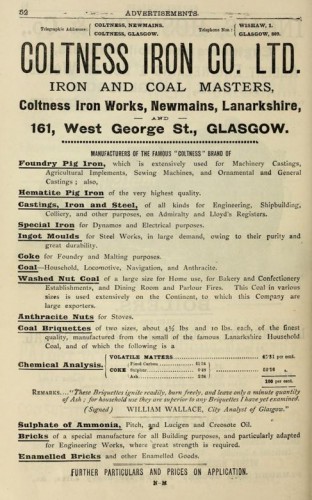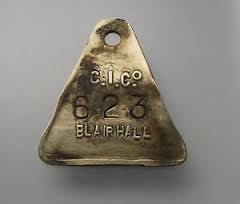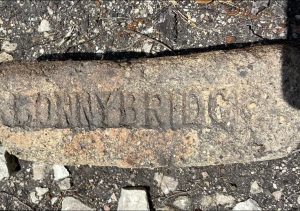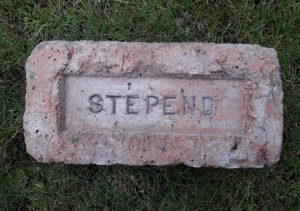Coltness Iron Co Limited, Newmains, North Lanarkshire.
Records of Coltness Iron Co Ltd, coal and iron masters and steel and brick manufacturers, Newmains, South Lanarkshire, Scotland
The Coltness Iron Co Ltd, Newmains, South Lanarkshire, Scotland, was established in the 19th century by Henry Houldsworth and his brother, Thomas. The brothers settled for the board and financial control, leaving the technical business of mining and metal making to competent managers. By 1922, the iron and steel interests of the business had been much diminished and the company concentrated on mining, appointing William Hamilton Telfer as general manager. Telfer came from a long family tradition of mine managers and had considerable mining experience in the Scottish coalfields. By this time, the company had already made strong connections with other important Scottish companies through shared directorships that were a great help to Telfer during the inter-war period. Following the general strike of 1926, Telfer urged the board to abandon coal iron making and the furnaces were dismantled. A programme of modernisation was then undertaken on the mining side of the business and new collieries were opened at Kingshill, South Lanarkshire, and Overtown, North Lanarkshire, even though the economic climate was unfavourable to such ventures. However, coal output steadily increased during the 1920s. The company’s position was made stronger through its link with the Wilson & Clyde Coal Co, colliers, Fife, with whom they purchased the business of James Waldy & Co, coal merchants of Edinburgh and Glasgow, Scotland, which provided a wide sales network for the coal produced. Telfer’s influence and success resulted in his appointment as managing director of the company in 1927 and he was able to influence the board to resisted the attempts to amalgamate coal companies through the 1930 Coal Miners Act.
It was clear that the company could not survive solely as coal masters and it was various diversifications that kept the company viable. Most notably, it was the success of the cement works at Newmains and the brick works at Carluke, South Lanarkshire, and Jordanhill, Glasgow, which provided the support for the colliery enterprise in this period.
(Jordanhill Brickworks were established about 1890 producing building bricks. It survived until 1928, by which time the raw material, the local bings, was exhausted. This Coltness Iron Company enterprise was then closed and the machinery transferred to the Giffnock Brickworks, on the site of the then recently closed Giffnock Colliery. The works at Giffnock remained until 1942 when the lease ran out and the plant was then dismantled. – source )
The 1930s saw the acquisition of neighbouring collieries such as the Ardenrigg Coal Co Ltd, South Lanarkshire, in 1932 and the Darngavel Coal Co Ltd, North Lanarkshire, in partnership with the Wilson & Clyde Coal Co Ltd, Bellshill, Glasgow. In 1934, the company sub-let part of the coalfields of Stewart & Lloyds Ltd, Corby, England, near Rotherham, South Yorkshire, England, and purchased that company’s 35 per cent stake in Wilson & Clyde Coal Co Ltd. The Coltness Iron Co Ltd had previously moved into the Warwickshire coalfields at Kersley, near Coventry, England, in 1902, though the purchase of the Warwickshire Coal Co Ltd. This colliery had been unprofitable between 1911 and 1923, but Telfer re-organised the concern and made it profitable.
Telfer retired as managing director in 1936, becoming vice chairman although he continued as manager of the Warwickshire concerns which now including Kersley’s neighbouring pit, the Sandwell Park Colliery in South Staffordshire.
In 1937, the company acquired the Cumberland Coal Co (Whitehaven) Ltd at Whitehaven, Cumbria, England, at the suggestion of Telfer. The 1930s also saw the development of the company’s cement and brick works and the steel foundry was modernised and expanded into the production of non-ferrous metal in partnership with ICI as Scottish Non-Ferrous Tube Industries Ltd, Hillington, Glasgow.
The company expended some £800,000 on new developments between 1936 and 1941 without having to increase the companies share capital and during difficult economic conditions. As a result, Telfer was appointed chairman in 1941, a post he held until 1946. By then, Coltness Iron Co Ltd was one of the largest colliery concerns in Scotland and England, employing nearly 5,000 men in both countries with an output of 5 million tons. Telfer had overseen improvements in working conditions, miners welfare, housing and pit safety.
The National Coal Board acquired the company’s assets in 1947 when the company was nationalised under the Coal Industry Nationalisation Act 1946. The Coltness Iron Co Ltd became Coltness Holdings Ltd in 1946 in order to acquire the assets and capital not taken over by the National Coal Board and entered into voluntary liquidation in 1947. At the time of nationalisation, the company had pits at Blairhall, Douglas, Kingshill, Hanockrigg, Woodend, Gillhead, Greenhead, Overtown, Duntilland and Collyshot, all in Scotland.
******************************
Coltness Iron Company – Early in 1937 it was decided to build a brickworks and this was done at Stepends. It came into production in May 1938 and has remained active ever since; it has a capacity of approximately 10,000,000 bricks a year … When W.H Telfer resigned the Chairmanship in 1945 he was succeeded on the board by W.A Wilson, Colonel Houldsworth becoming chairman. One of the newly constituted board’s decisions concerned the future of the brickworks, which were sold to the Coltness Company to which they passed on the vesting date of 01/01/1947 when the collieries were transferred to the National Coal Board. About 1880 the Coltness Company began making bricks. Two brickworks were built at Hallcraig, Carluke and the other at Jordanhill on the Western outskirts of Glasgow. The former was in operation until 1947 when it was replaced by a modern works at Mayfield, also in the Carluke district. The bricks were made from blaes left from earlier mineral workings. Large quantities of Hallcraig bricks were used in building the London Midland and Scottish low-level railway through Glasgow; 8,000,000 bricks were supplied for this purpose, the largest ever single order for bricks the Company’s salesmen ever had.
1837 – Coltness Iron Company started at Newmains.
1839 – Coltness Iron Company founded. There were some very old brick kilns to the north of the ironworks which are believed to date from around that time. The Newmains Fireclay Works were their main brick producing site. Bricks manufactured at the Newmains Fireclay Works were lower grade and latterly they concentrated on glazed enamel whiteware. – Source Kenneth W Sanderson.
1858 – Mineral Statistics of the United Kingdom of Great Britain and Ireland for 1858 –Coltness, Clay of coal measures. Name of freeholder – Lord Belhaven. Manufacturer – Lord Belhaven. Manufacture estimated annual output – 409,826 bricks, 55,300 fire bricks, 827,844 drain pipes, 166,050 composition bricks, 6,572 other articles. (Note SBH – I believe this entry may relate to the Coltness Iron Co Limited as opposed to the Coltness Brick and Tile Works).
04/08/1888 – Paisley and Renfrewshire Gazette – To architects, engineers and builders – Bricks of special manufacture for all building purposes and particularly adapted for engineering works where great strength is required. Coltness Iron Co Ld, Newmains.
Below – 1889 – Advert Coltness Iron Company.

Below – 1893 – Advert Coltness Iron Company.

Below – 12/07/1899 – Daily Telegraph and Courier – Coltness Iron Company Limited prospectus. The three brickworks of the company are in efficient condition and are situated at Newmains and Hallcraig, in Lanarkshire both being the absolute property of the company and Jordanhill, Glasgow. The manufacture of enamelled fireclay goods is carried at Newmains, and that of building bricks at Hallcraig and Jordanhill, the capacity of the two latter being about twenty millions of bricks per annum. The properties absolutely owned by the company, including the above-mentioned purchase, are as follows (1) At Newmains, about 325 acres of mineral area, and 270 of surface area, upon which the blast furnaces, &c., are situated, and having abundance spare room for future extension. (2) Woodend, in Linlithgowshire, about 1,024 acres surface and minerals, upon which one of the company’s collieries. (3) At Hallcraig, in Lanarkshire, about 186 acres of surface and minerals, upon which is one of the company’s brickworks. The mineral in this property is chiefly clay band ironstone. (4) Mayfield and neighbourhood, in Lanarkshire, about 187 acres of the mineral area — chiefly clay band ironstone and limestone.
1936 – 1937 – Coltness Iron Co Ltd, iron and coal masters, manufacturing chemist, oil merchants, iron and steel founders, manufacturers of Portland cement, fire clay enamel goods and composition building brick, 34 Robertson Street. Works – Newmains, Lanarkshire.
10/04/1936 – The Scotsman – Coltness Iron Company Limited. Annual company meeting … The working of the brick and cement works has been affected through building construction having been held up owing to the severe winter weather, but the prospect ahead for building material is quite bright …
12/04/1938 – The Scotsman – Coltness Iron Company Limited. Annual company meeting … Our brickworks have been going full, with a good demand for building brick …
13/04/1940 – The Scotsman – Coltness Iron Company Limited. Annual company meeting … Our cement and brickworks were extremely busy until the end of the year when the building industry was practically brought to a standstill unless for Government and A.R.P work and with this exception, the market for bricks has almost disappeared …
12/10/1951 – Edinburgh Gazette – The Companies Act, 1948. Company Limited by Shares. Special Resolution (pursuant to Section 141 (2)) of Coltness Iron Co Ltd, passed 8th October 1951. At an Extraordinary General Meeting of the above-named Company, duly convened, and held in The Merchants’ Hall, 30 George Square, Glasgow, on the 8th day of October 1951, the subjoined Special Resolution was duly passed, viz. :— That the Company be wound up voluntarily, and that Lieut.-Col. James Filmer Hamilton Houldsworth, Coltness House, Wishaw, Lanarkshire, and Ian Wilson Macdonald, Chartered Accountant, Glasgow, be, and are hereby, appointed Joint Liquidators for the purpose of such winding-up. James F.H Houldsworth, Chairman.
The Companies Act. 1948. Notice of Appointment of Liquidator, pursuant to Section 305. Members voluntary winding up. Name of Company, Coltness Iron Company Limited. Nature of Business, Iron Masters and Brickmakers. Address of Registered Office, 118 Queen Street, Glasgow. Liquidators’ Names and Addresses, Lieut-Col. James Filmer Hamilton Houldsworth, Coltness House, Wishaw, Lanarkshire, and ‘ Ian Wilson Macdonald, Chartered Accountant, 149 West George Street, Glasgow. Date of Appointment, 8th October 1951. By Whom Appointed – Members of Company by Special Resolution. James F.H Houldsworth, Ian W MacDonald, liquidators.
1961 – 1962 – A directory of British clay products and manufacturers – Coltness Iron Company Ltd, Newmains, Wishaw, Lanarkshire. Tel Wishaw 2212 – 3. Tel Address – Coltness Newmains. Works – Mayfield Brickworks, Carluke, Lanarkshire and Stepends Brickworks, Plains, Airdrie, Lanarkshire.
22/05/1964 – Wishaw Press – Change of title for Coltness Iron Company. New company to boost brick production. Bold new plans for the future are announced this week By the Coltness Iron Company Ltd. The plans, aimed at putting the company in the forefront of Scottish industry, include a change of title, the formation of a new company to handle sales, the switch of headquarters from Newmains to Glasgow and a 75 per cent increase in brick production at the Morningside, Airdrie and Carluke brickworks. The ” meet the future ” plans were announced at a Press Conference, which followed an extraordinary general meeting of the company, held in the Central Hotel, Glasgow, last Friday. Company chairman, Lt. Col. J. F. H. Houldsworth, announced the change of name. After 127 years the old title Coltness Iron Company Limited goes out. The new company title is COLTNESS INDUSTRIES LIMITED. A new company, Coltness (Sales) Ltd. has been set up to handle all the sales of Coltness Industries and group headquarters are to be moved from Main Street. Newmains, to a new building which is almost complete, Clive House, India Street, Glasgow. Brick production at Chapel Brickworks, Morningside, Mayfield Brickworks, Carluke and Stepends Brickwork Airdrie is to be stepped up by 75% which should result in the production of over one million bricks a week. The step-up in production has meant an investment of £150,000 by the company in new machinery. The plans will mean an additional 30 jobs at the Chapel Brickworks, Morningside, where a new kiln is being built and where production is expected to bump from 130,000 to 420,000 bricks a week in August. Referring to the change of name of the company Col. Houldsworth said: ” This is a natural step to take, especially as the company is no longer identified with iron and steel foundries or, indeed, coal mining although we are still proud to be of service to the N.C.B. through our subsidiary company, Beckett & Anderson who manufacture mining equipment.” Col. Houldsworth continued “We are now a well-diversified Scottish industrial company with widespread interests on Clydeside, in Stirlingshire and Lanarkshire manufacturing bricks, nails, central heating, mining haulage and marine winch equipment. Our total assets are over £1 million. We employ 400 people and we hope before long that through growth, development and diversification, we shall employ many more. I believe all the changes underline our belief in the future and our intention to think far ahead and plan accordingly”. Concluding, Col Houldsworth said,” I hope that what I have said indicates that Coltness Industries Limited are today 127 years young. We intend to keep it that way and we intend to play our part in the life and prosperity of Scotland. Coltness Iron Works were founded at Newmains, in 1837. In 1899 Coltness Iron Company became a public company. By that date, in addition to nine blast furnaces and iron and steel foundries, the Company owned 20 coal mines and pits in the counties of Lanark, West Lothian, Fife and Midlothian.
By 1930 the Company’s coal mining interests had spread to West Cumberland and Warwickshire. Following the nationalisation of the mines on 1st January 1947, the Company was left with its iron and steel foundries, brickworks and blast furnaces and cement works. Since then the management has sought expansion by diversification in various directions through the parent company and its subsidiaries. In 1947 Mayfield brickworks were built at Carluke and the following year Beckett & Anderson became a wholly-owned subsidiary. In 1950 Newmains Brickwork company was purchased and during 1952 the iron and steel foundries were sold. Eight years ago J. & W. Somerville became a wholly-owned subsidiary. In 1963 the blast furnace, cement works closed.
March 1970. – Clay Worker Magazine – Coltness Industries Limited – General Manager – Required to control the entire operation of three Brickworks producing over one million common bricks per week. The works have been modernised with new stiff plastic machinery, conveyor handling systems and Hoffman kilns and are well managed. The applicant should be 30 to 40 years of age. A high management ability and first-class practical knowledge of brickmaking is absolutely essential. He must be conversant with and able to maintain full budgetary control and be prepared to spend time and energy on the continued successful operation of these works. The position will be one of direct responsibility to the Managing Director. The commencing salary will be £3,000 per annum with a company car, free life insurance, assistance with removal, good contributory pension scheme. Applications should give full details of age, experience, positions held, availability, eat. And be addressed to Mr A. L. Teller, Managing Director, Coltness Brickworks Limited, Church Avenue, Newmains, Wishaw, Lanarkshire, Scotland.
Below – Unknown date – Coltness Iron Co, Newmains, Lanarkshire advert … bricks for building purposes and enamelled sanitary goods …










